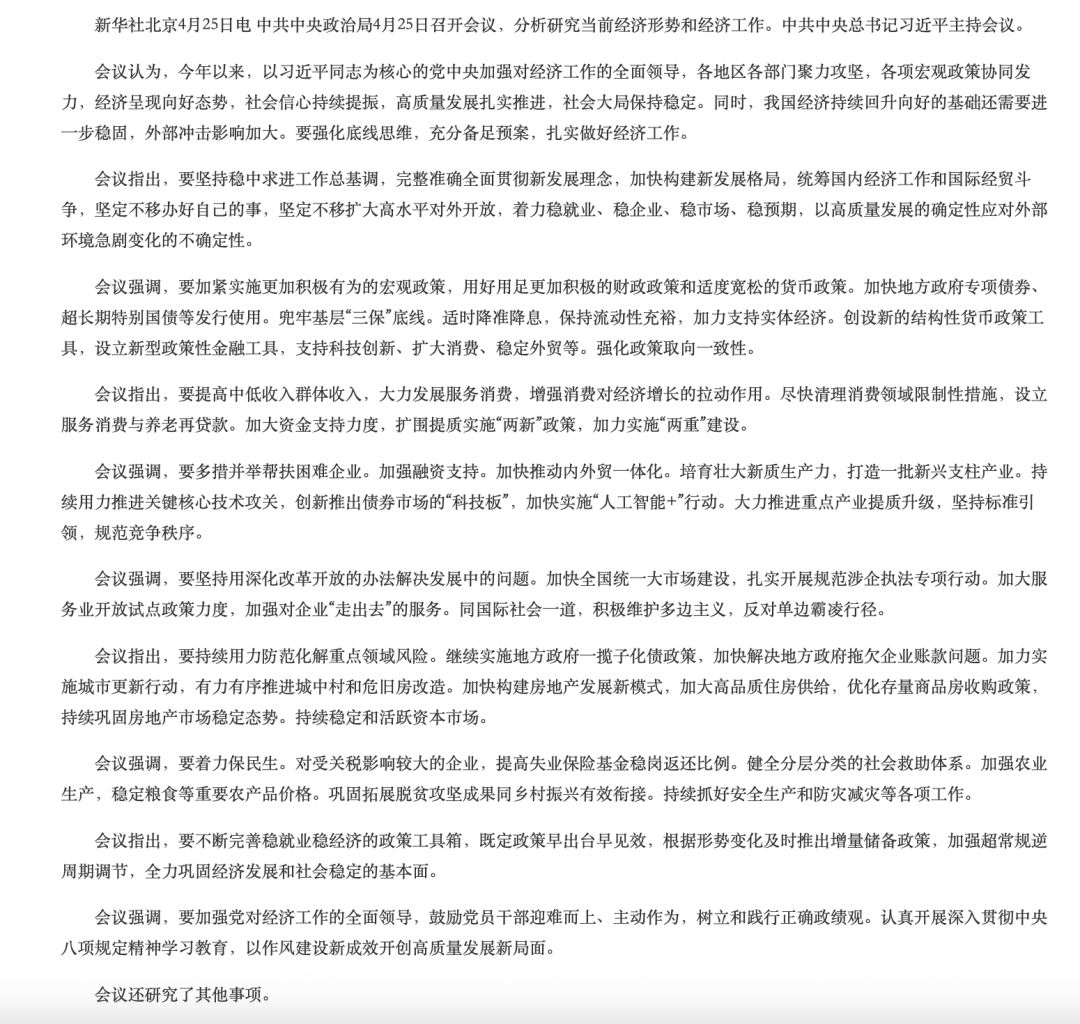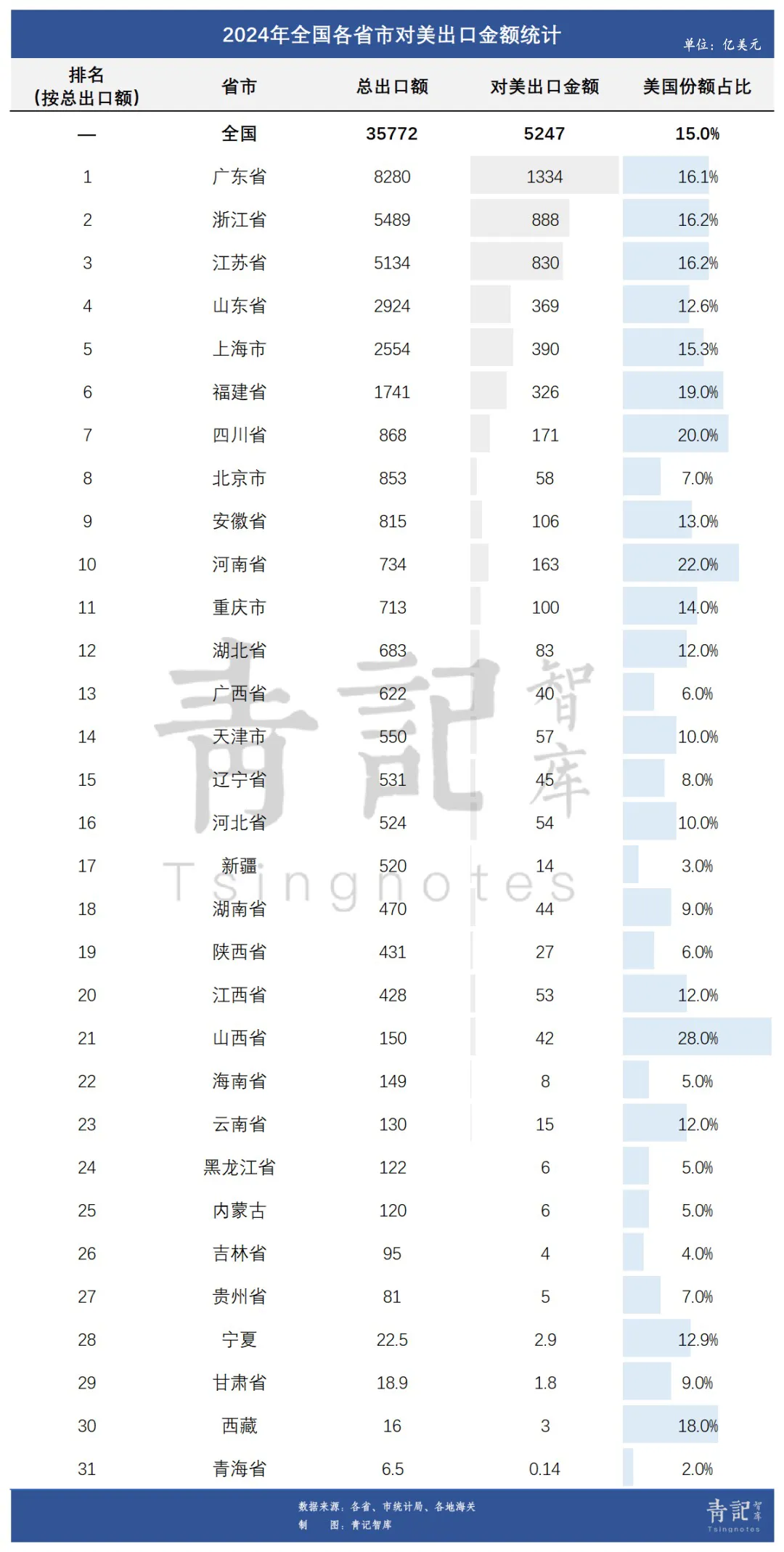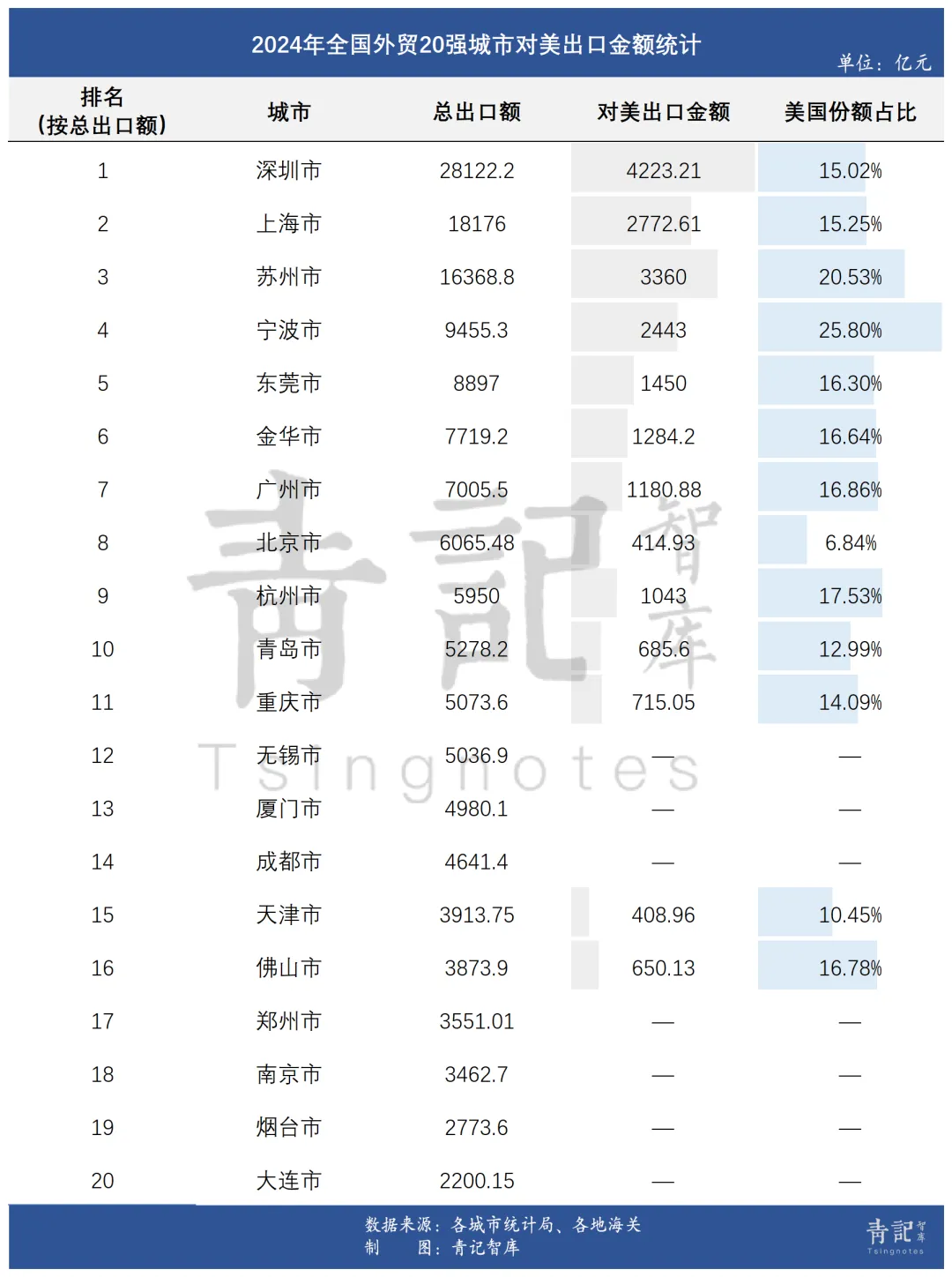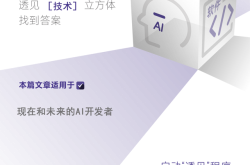Top-Level Meeting Sets Tone for Tariff War, Unveils Major Moves in Key Cities
![]() 04/27 2025
04/27 2025
![]() 968
968
Abandon illusions and prepare for struggle.
On April 25, a pivotal meeting on the current economic landscape and future strategies was held, categorizing this tariff war as an "international economic and trade struggle."
The core objectives of this meeting were to harmonize domestic economic endeavors with international trade struggles, steadfastly manage domestic affairs, unwaveringly expand high-level international openness, prioritize the stabilization of employment, enterprises, markets, and expectations, and address the uncertainties posed by rapid external environmental changes through the certainty of high-quality development.

This resolute countermeasure and characterization as an "international economic and trade struggle" aim to achieve favorable outcomes through struggle, rather than succumbing to Trump's whimsical demands.
As the great teacher wisely stated, "Unity is forged through struggle, and unity fades when pursued through concession."
However, for foreign trade enterprises with a total export value to the United States of $524.656 billion (approximately RMB 3.8 trillion), the challenge of surviving this struggle is undeniably formidable.
This top-level meeting clearly emphasized the need to "focus on stabilizing employment, enterprises, markets, and expectations."
Particularly noteworthy is the introduction of the new "four stabilities," with "stabilizing enterprises" being highlighted for the first time, explicitly referring to private foreign trade enterprises affected by tariffs.
Regarding the stabilization of enterprises, the meeting outlined both general directions and specific measures.
It stressed the importance of adopting multiple measures to support struggling enterprises, enhancing financing support, and accelerating the integration of domestic and foreign trade. For enterprises significantly impacted by tariffs, the proportion of unemployment insurance funds returned will be increased to stabilize jobs.
Furthermore, just this afternoon, the Ministry of Commerce announced the news of another crucial meeting.
From April 24 to 25, the 2025 National Trade Friction Response Work Conference was held in Beijing.
The meeting underscored the necessity of enhancing political standing, adhering to a systematic approach, fostering bottom-line thinking and limit thinking, focusing on preventing and resolving trade risks, and contributing to the high-quality development of trade.
In response to the current challenges faced by foreign trade enterprises, it is imperative to be mentally prepared and have concrete response plans.
The day before, on April 24, He Yadong, spokesperson for the Ministry of Commerce, stated at the regular press conference that the Ministry would increase support for foreign trade enterprises to expand domestic sales and collaborate with platforms, industries, and local governments to form a unified force for domestic sales expansion.
It is reported that the Foreign Trade Quality Products Tour Procurement Group, formed by the Ministry of Commerce, conducted its inaugural procurement event at the Jiangsu station, attracting over 80 large supermarkets, e-commerce platforms, and wholesale and retail enterprises for on-site purchases. "Through these procurement activities, foreign trade enterprises have discovered new sales channels, while purchasing enterprises have sourced high-quality products. For instance, at the Jiangsu station event, a coffee cup brought by a foreign trade enterprise instantly became a best-seller at the exhibition."
He Yadong noted that the Ministry of Commerce would continue to expand the procurement tour group, hold special procurement matchmaking events in major foreign trade and consumption provinces, increase support for foreign trade enterprises to expand domestic sales, and ensure that more foreign trade quality products reach households nationwide.
For provinces and cities with a significant proportion of exports to the United States, this translates into concrete actions to assist foreign trade enterprises.
In terms of total export value to the United States, Guangdong leads with $133.4 billion, followed by Zhejiang with $88.8 billion and Jiangsu with $83 billion.
Shanghai and Shandong rank fourth and fifth, with export values to the United States of $39 billion and $36.9 billion, respectively.

At the city level, among the top 20 cities in national foreign trade, Shenzhen, Suzhou, Shanghai, Ningbo, and Dongguan rank at the top in terms of export value to the United States, with values of RMB 422.321 billion, RMB 336 billion, RMB 277.261 billion, RMB 244.3 billion, and RMB 145 billion, respectively, totaling over RMB 1.3 trillion.

In terms of the proportion of exports to the United States, cities such as Ningbo (25.8%), Suzhou (20.53%), Hangzhou (17.53%), and Guangzhou (16.86%) exhibit a high degree of dependency on exports to the United States and are therefore most impacted.
It is crucial to note that the impact on these cities extends beyond the exported goods on paper but also encompasses the upstream and downstream enterprises within the industrial and supply chains, potentially affecting a much larger number of entities.
Moreover, different cities are affected by various industries to differing degrees, necessitating tailored measures from each province and city.
Taking Ningbo as an example, on April 17, the city's leader specifically mentioned the "one enterprise, one policy" support plan during a special research session on foreign trade work:
Strengthen monitoring and analysis of economic operations and international situation changes, promptly formulate effective measures, provide on-site precise services, and implement the "one enterprise, one policy" support measures. It is essential to closely coordinate and integrate policies to exert joint efforts, study and introduce a comprehensive package of relief policies based on identified problems, further build platforms, integrate resources, connect enterprises, optimize processes, reduce costs, fully leverage the leading, supporting, and guaranteeing role of policies, and diligently address practical difficulties faced by enterprises.
Previously, Ningbo's industry associations have taken swift action to build a bridge for the government to understand the true situation and aspirations of enterprises.
On April 9, the Ningbo Federation of Industry and Commerce jointly held a symposium for private enterprises with relevant departments, including the Ningbo New Energy Industry Chamber of Commerce, which organized over ten private enterprises, and the Ningbo Plastics Industry Association, which organized over 20 private enterprises, to participate in this symposium.
Shenzhen, with the highest export value to the United States, has issued a list of ten policies to stabilize foreign trade, focusing on assisting enterprises in stabilizing orders and expanding markets.
For instance, Shenzhen implements a support plan for key overseas exhibitions, aiding enterprises in participating in 211 overseas exhibitions throughout the year, and providing a subsidy of up to RMB 600,000 based on 50% of the actual booth fees incurred by the enterprise. It also supports enterprises in exploring the domestic market, offering a subsidy of up to RMB 800,000 for booth fees, decoration fees, supporting economic and trade activity fees, and undertaking fees for organizing local enterprises to participate in domestic exhibitions outside the city. Additionally, it supports registered enterprises of the China (Shenzhen) International Trade Single Window to utilize the basic online AI customer expansion service function of "Shenzhen Enterprise e-Trade" free of charge.
Suzhou has taken a specific measure.
According to news from "Suzhou Release," recently, the Suzhou Port Management Committee Office announced the provision of free storage services for import and export heavy containers for Suzhou foreign trade enterprises at Suzhou Port. To further emphasize the vital role of foreign trade enterprises in the city's economic development and support them in overcoming difficulties, all container terminals at Suzhou Port will now provide free storage services for import and export heavy containers for the city's foreign trade enterprises, tentatively from April 18, 2025, to July 17, 2025, for a period of three months.
Furthermore, the southeastern coastal provinces have explicitly requested banks to "not withdraw loans and not discontinue loans" to foreign trade enterprises.
According to a city commercial bank interviewed by Caixin Global, the bank actively responds to the directives of relevant departments, adopts the practice of "not withdrawing loans and not discontinuing loans" to foreign trade enterprises, and simultaneously provides customized credit support plans for leading foreign trade enterprises. Adhering to the principle of "one enterprise, one policy," the bank strives to excel in financial services. "Based on our understanding, relevant departments within the province attach great importance to credit support. If any bank has recently withdrawn loans from foreign trade enterprises, it should promptly rectify this situation after April." It is now time to test the execution and professionalism of local governments once again.
Related Reading:
Which city is most impacted by the "tariff war"?








